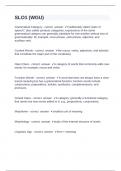SLO1 (WGU)
Grammatical Category - correct answer ✔Traditionally called "parts of
speech"; also called syntactic categories; expressions of the same
grammatical category can generally substitute for one another without loss of
grammaticality: for example, noun phrase, verb phrase, adjective, and
auxiliary verb.
Content Words - correct answer ✔the nouns, verbs, adjectives, and adverbs
that constitute the major part of the vocabulary
Open Class - correct answer ✔A category of words that commonly adds new
words: for example, nouns and verbs
Function Words - correct answer ✔A word that does not always have a clear
lexical meaning but has a grammatical function; function words include
conjunctions, prepositions, articles, auxiliaries, complementizers, and
pronouns.
Closed Class - correct answer ✔A category, generally a functional category,
that rarely has new words added to it: e.g., prepositions, conjunctions.
Morpheme - correct answer ✔smallest unit of meaning
Morphology - correct answer ✔study of the internal structure of words
Linguistic sign - correct answer ✔form + meaning
,Monomorphemic word - correct answer ✔A word that consists of one
morpheme. For example, sing but not singer, finger but not fing, and
misogynist but not ogynist.
Free morphemes - correct answer ✔a single morpheme that constitutes a
word
Affixes - correct answer ✔bound morpheme attached to a stem or root
(prefixes, suffixes)
Bound morphemes - correct answer ✔must be attached to other morphemes
(-ly, -ed, non-)
Circumfixes (discontinuous morphemes) - correct answer ✔affixes that
attach to both the beginning and end of a root
Derivational morphemes - correct answer ✔affixes that can be added to a
morpheme to change its meaning and may change its part of speech
Lexical gaps (accidental gaps) - correct answer ✔a possible but not real
word
inflectional morphemes - correct answer ✔change the function of a word,
such as in number, tense, etc. creating a new word. example: add "s" to cat to
create the plural cats or ed to hint to create the past tense hinted. inflectional
morphemes carry grammatical information. DO NOT CHANGE THE
MEANING
Syntax - correct answer ✔Sentence structure
, Determiners - correct answer ✔to express definiteness, indefiniteness,
quantity, ie. THE book, A table, EVERY day
Demonstratives - correct answer ✔this, that, these, those
Modal - correct answer ✔auxillary verb that is used to express an attitude
toward the action or state of being of the main verb (can, could, will, would
must)
Auxiliary verbs - correct answer ✔helping verbs ( have, be, will)
Structure Dependent - correct answer ✔(1) A principle of Universal Grammar
that states that the application of transformational rules is determined by
phrase structure properties, as opposed to structureless sequences of words
or specific sentences; (2) the way children construct rules using their
knowledge of syntactic structure irrespective of the specific words in the
structure or their meaning.
Lexical Categories - correct answer ✔A general term for the word-level
syntactic categories of noun, verb, preposition, adjective, and adverb. These
are the categories of words like man, run, large, and rapidly, as opposed to
functional category words such as the and and
Sound symbolism - correct answer ✔The notion that certain sound
combinations occur in semantically similar words: for example, gl in gleam,
glisten, and glitter, which all relate to vision
Onomatopoeic - correct answer ✔formed in imitation of a natural sound
(meow and buzz)




